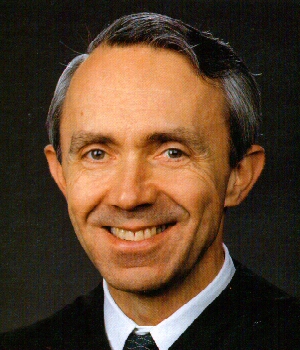
And so the Supreme Court loses its only Episcopalian.
The most recent Episcopalian on the court, other than Souter of course, did not leave the court so much as the church. Clarence Thomas converted to Catholicism.
If the newly outgoing Episcopalian is also replaced by a Catholic (albeit this time in the form of a different person), the Catholic influence over the church extends to 2/3 of it.
The count right now is presently 5-2-2 with 5 Catholic, 2 Jewish, and 2 protestant Justices. Soon to be one protestant. That one protestant is John Paul Stevens. Next to Ginsberg, he’s the most likely to create the next vacancy on the court.
There are not many institutions where protestants can feel so underrepresented. Indeed, it’s conceivable that by the end of Obama’s first administration, the court could be entirely Catholic and Jewish.
As far as bean counting goes, Obama probably has two concerns. First, we still have no Hispanic Supreme Court Justice. So if he goes that route, it’s as likely as not that we will get that 6th Catholic (though, notably, the 1st Catholic not to be a part of the conservative coalition on the court). However, we also only have one woman on the court. So if he finds himself a non-Hispanic woman, there’s a pretty good chance that she’s going to be a protestant.
Maybe even an Episcopalian.
About the Author
6 Responses to Souter Up (And Out)
Leave a Reply
please enter your email address on this page.

The frontrunner seems to be federal judge Sonia Sotomayor, who is Hispanic. I can’t find anything about her religion. Chances are she’s Catholic.
I poked around and didn’t get any definitive answers. She did attend a Catholic high school, though that doesn’t necessarily mean a whole lot. If she gets the nod, I’ll have to keep an eye out.
Funny. People’s tribal affiliations can cut across all sort of lines, and influence who they root for to be appointed. Amid the sex/race/ideology hubbub, it’s interesting that this is the first time I’ve seen religion brought into the mix.
What the Supreme Court really needs are some radical Islamic fundamentalists, some Missionary Baptists, some Jehovah’s Witnesses, and at least one flamboyantly gay justice.
AC,
Oh, I’d much rather have a Catholic or Jewish person who would rule in ways that I would prefer than an Episcopalian that would not, but I figure that ideology is going to be a fixed trait. Obama won’t appoint someone conservatives aren’t going to like and I suspect will also disappoint hard-core liberals (at least at the outset). So I focus on the unknowns.
Episcopalians can’t really complain about being too out-of-the-loop. We’re overrepresented in just about every seat of power given our small portion of the population. Though notably, it seems like former Episcopalians are making the greater strides. The Republican presidential nominee in 2008 was a quasi-former Episcopalian as was one of the Democratic frontrunners in 2004 (Howard Dean). And, of course, there’s one former Episcopalian Supreme Court Justice.
But yeah, you’re right, it’s funny how these things cut. I like seeing people that I see something familiar in. Since I’m a white male as are most of the people in power, I have to look more specifically. Religious denomination, regionalism, and even lack of having gone to school at Harvard or Yale. The last high-profile grad of Southern Tech to become politically significant became something of an infamous figure, so I’ll take having gone to one of the hundreds of colleges other than Harvard or Yale. There’s not much rational behind it and it’s the sort of thing I will toss aside immediately when I see it contrary to the way that I think our country should go… but it’s a factor. Weird, isn’t it?
Some interesting things about the Supreme Court’s “diversity:”
Six justices attended Harvard Law School. Two others went to Yale Law School. All of them were federal appeals court judges at the time of appointment. Only one (Souter) ever presided over a trial as a judge. Only one (Stevens) ever served in the military.